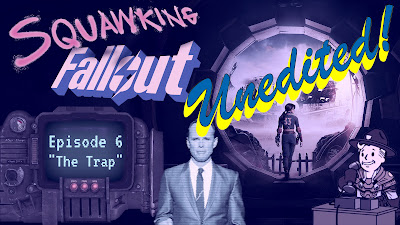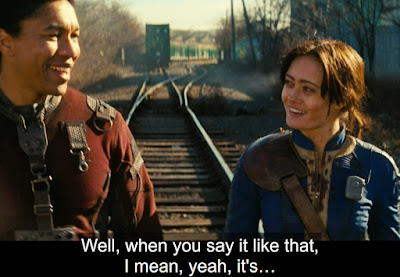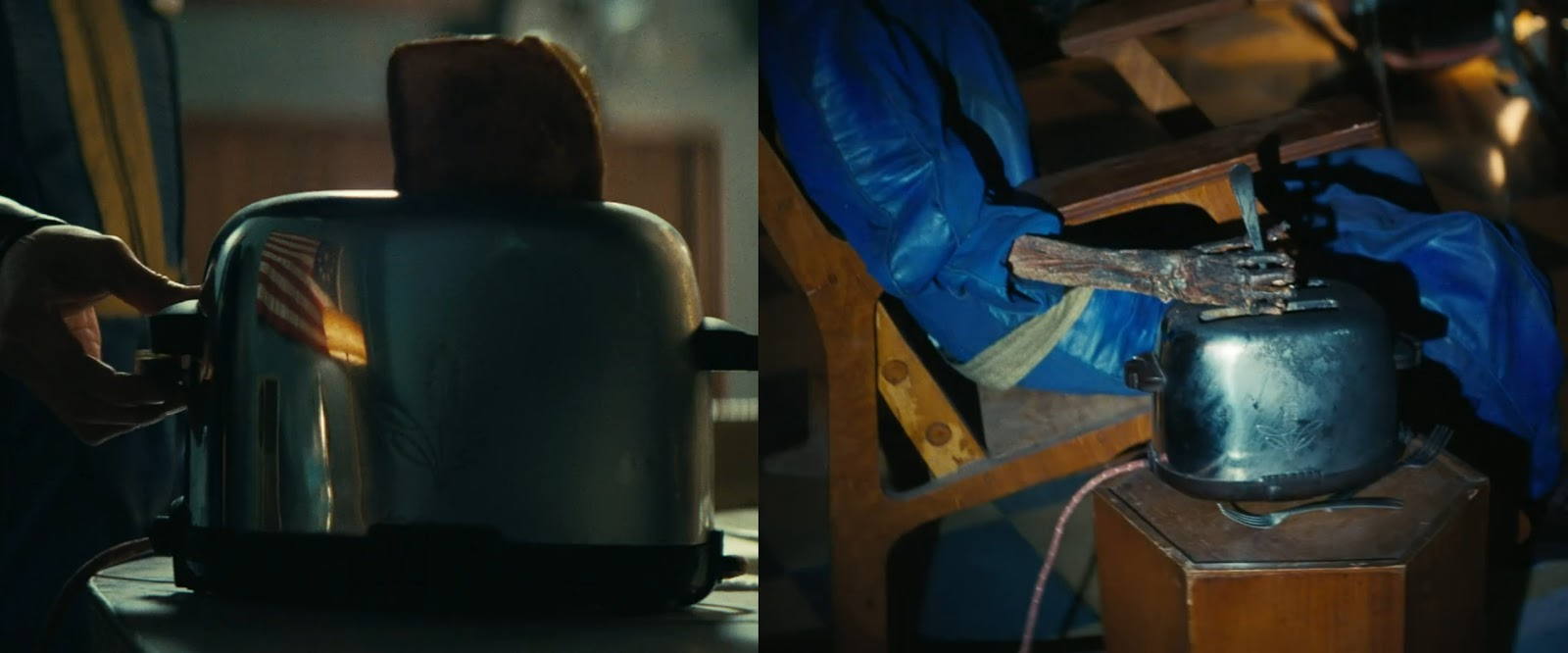⬇️Listen Now⬇️ |
⬇️Listen Now⬇️ |
⬇️Listen Now⬇️ |
|
to listen to these episodes
in your favorite Podcasts App
Taking our 1st stab into the Game of Thrones universe, House of the Dragon finally returns after 2 years away: #TeamBlack licks its wounds after the loss of Lucaerys Targaryen, while Daemon Targaryen amplifies Rhaenyra Targaryen's cries for vengeance. #TeamGreen finds the center does not hold and will have an even harder time of it after Blood and Cheese are through.
Oi! We're busting into The Boys universe, too! Covering the first 4 episodes, titled, Department of Dirty Tricks, Life Among the Septics, We'll Keep the Red Flag Flying Here, and Wisdom of the Ages. With it's next season (5) being its last, our full cast of characters are finally becoming much more self-aware. This makes them simultaneously terrifying and fascinating but also, more than anything else, moves them into a far more grey area than we're used to.
In varying degrees, everyone in this story is a "bad guy" or a coward: the difference is the degree to which they are self-aware. In contrast to the start of the series, we're not sure whether any of these characters see themselves as the hero of their own story (any longer). Regardless, they all do their best to forge a better path forward.
Oi! We're busting into The Boys universe, too! Covering the first 4 episodes, titled, Department of Dirty Tricks, Life Among the Septics, We'll Keep the Red Flag Flying Here, and Wisdom of the Ages. With it's next season (5) being its last, our full cast of characters are finally becoming much more self-aware. This makes them simultaneously terrifying and fascinating but also, more than anything else, moves them into a far more grey area than we're used to.
In varying degrees, everyone in this story is a "bad guy" or a coward: the difference is the degree to which they are self-aware. In contrast to the start of the series, we're not sure whether any of these characters see themselves as the hero of their own story (any longer). Regardless, they all do their best to forge a better path forward.
| David Cameo: | |
| Rachael Burt: | |
| Sherrandy Swift: | |
| Bridget Mason-Gray: |
SPECIAL GUEST
| Carinae Davey: |
🎬 Stream these uncut, hours-long discussions - full to the brim with tons of pre-show bater, post-show aftermath, and tons and tons of flubs and insights (that hadn't made the cut) in between - when you either Tip us on Ko-fi or join a membership tier (for as little as $1 /month) on either Ko-fi or Patreon!
HOUSE OF THE DRAGON
2x01 A Son for a Son
- The opening scene at Castle Black. The (dis)honor in going to The Wall and parallels to Australia's colonial history.
- Make sure you watched the correct episode, Bridget!
- The sacrifice of Winterfell's Greybeard's during winter.
- The show presents #TeamBlack (Rhaenyea Targaryen, et al) far more sympathetically compared to the books, which is basically a historical account by unreliable sources of hundreds of years of Targeryan reign.
- The death of Jaehaerys Targaryen, Aegon Targaryen's heir, was motivated by a desire to fulfill Rhaenyra's call for revenge on Aemond Targaryen for killing her son, Lucaerys Targaryen. The books describes the actual decapitation in far more gruesome and sadistic detail.
- Helaena Targaryen is a seer/dreamer and her visions hold significance that nobody else on the show seems to acknowledge.
- The power dynamics between men and women are explored, particularly through the character of Ser Criston Cole.
- The title sequence of the show has changed and contains references of Targaryen history, up until present day. Hoping that this will depict further events that will occur this season.
- Personal responsibility is lacking in mostly male characters. Even the characters who are driven by loyalty and honor commit to actions that have consequences - for both themselves and the realm.
- Playing the Game of Thrones requires making difficult choices: those ambitious enough to make a play for The Iron Throne must maintain healthy doses of honor, thinking of the good of the realm, and necessary force.
- The complexity of the characters adds depth to the story and keeps the audience engaged. Tyland Lannister is played by Jefferson Hall, who also played Ser Hugh of the Vale on Game of Thrones. Dave thinks he looks far too similar to Dave Portnoy of Barstool Sports, which really messes with his head.
- Certain scenes (from this season and past ones) have significant meaning and foreshadow future developments.
- We speculate on the direction of future episodes and the fate of certain characters.
- The episode contains many mentions of brutal/wanton violence.
- Harrenhal is a strategic location in the war between Team Black and Team Green, with a curse on all those who've inhabited it.
- The lineage and relationships between the characters are complex and interconnected. We also discuss other spin-offs that were previously and are still in development.
- Belief that Dragons wanes in Westeros as its society forgets over centuries. The spread of information is limited in a world with low-levels of literacy and a lack of communications infrastructure.
- Lord Larys Strong raises questions from us about his motives, as a result of his actions in The Red Keep.
- Humor is more contained and less prevalent in this series, when compared to Game of Thrones. Though House of the Dragon's plot is a more slimmed-down by comparison, it's still a complex tale that necessitates some academic vigilance to understand all its unfolding events.
- Prior knowledge of the Game of Thrones universe enhances the viewing experience of House of the Dragon, but isn't required. Spinoffs often dive into the pre-existing universe to provide more depth and context.
- The Targaryens have a strong and mystical sense of loyalty to their bloodline. It provides them with an odd sense of clarity when regarding those of other houses. They are also driven by a sense to right wrongs.
THE BOYS
4x01 Department of Dirty Tricks
4x02 Life Among the Septics
4x03 We'll Keep the Red Flag Flying Here
4x04 Wisdom of the Ages
- The fourth season of The Boys explores themes of societal divide and the desire to be the hero of one's own story.
- Character development is a key aspect of the season, with A-Train, Billy Butcher, Starlight, and others undergoing significant arcs.
- The hosts speculate on the endgame of Victoria Newman and the potential role of the virus in taking down Homelander.
- The complex relationships between fathers and children are explored.
- The search for acceptance and love is a common theme.
- The show delves into gray areas of morality.
- The motivations and struggles of Homelander are examined. Legacy and learned-behavior play a role.
- Vought is the primary manipulator, influencing not only all characters, but the world.
- Parallels/Mirroring between the characters.
- The nature vs nurture of Homelander's actual existence of emotions are debated.
- Power corrupts all individuals. Supes to varying degrees, are an example of absolute power corrupting, absolutely.
- Societal and institutional pressures play a role in shaping individuals, particularly Homelander and Ryan.
- The parallels between the show and real-life political dynamics are discussed: Media used to play a much more significant role in shaping public opinion and amplifying certain voices. Now, in both our universe and that of The Boys, social media has given everyone a voice. Constant exposure to news can generate fear and paranoia, affecting people's behavior.
- The Boys explores fluid power dynamics, the manipulation and corruption of corporations and institutions, and the moral ambiguity of its characters.
- The show uses hyper-violence and gratuitous sexually suggestive situations (to put it diplomatically) to challenge viewers' sense of morality.
- A-Train is undergoing a redemption arc and we wonder whether he might end up being the hero of this story, since he was the supe that started Hughie Campbell on his journey with The Boys. When Hughie forgives A-Train, it's because he sees bigger picture beyond his original quest for revenge.
- Starlight's character is complex: with more of her past revealed, it slowly shifts our perception of her as she proceeds to unravel.
- Male nudity, by way of Splinter, is seen as a step towards more on-screen egalitarian nudity.
- The fate of Barbara, Project Manager for Project Odessa, is left uncertain. Even though Homelander is CEO of Vought in name, it's real unclear who is running the show.
- The relationships between all characters in The Boys are complex and involve seeking power, regaining control, and finding acceptance:
- Kimiko and Frenchie's relationship is couched in mutual acceptance and love: they have a deep connection that goes beyond romance (but not limited to, perhaps).
- Homelander/Butcher and Ryan's relationship is complicated by the (physical/positional) power dynamic between them, their upbringing, and the trauma they have endured.
- Marvin "Mother's" Milk struggles with control: his character represents the need for order and stability.
- All the characters on this show have continued to reinvent themselves in their desire for purpose and acceptance; however, as characters confront their past in an attempt to move forward, they acquire an overwhelming dose of self-awareness, which sends them down a dark path of their own making.
- The Boys is still a show that mostly doesn't tend to take itself too seriously and has funny moments.
- We apologize for the uncharacteristic lack of structure, easter eggs, and detail in this episode discussion: this was done out of necessity to stay ahead of our episode releases.
- Still, in episode 4, Dave attempted to read some of the information that was left on the Project Odessa bulletin board, but it was predominantly incomprehensible.
FALLOUT
1x07 The Radio
- Don't forget to pick up our latest designs in our merch store: whether it be one, both, or the other SQUAWK-Tec designs; our SQUAWKING Fallout logo design; one, both, or the other SQUAWKING DEAD Hosts design; or even our The Ones Who SQUAWK logo and/or art designs!
- First impressions and character analysis of The Ghoul's motivations and moral ambiguity play a significant role in shaping our understanding of the narrative.
- The impact of choices in a post-apocalyptic world is explored, highlighting the consequences and ethical dilemmas faced by each character.
- Past experiences and personal history influence the present decisions and behaviors of the characters, adding depth to their actions and motivations.
- The trepidation exhibited by the (former) members of Vault 33 as they prepare to enter their new home in Vault 32, venturing into the unknown, reflects the fear of change and uncertainty. The emotional impact of leaving behind familiar surroundings and adapting to a new environment is a significant theme in the conversation.
- Pop culture references and cameos, like the appearances of Eric Estrada and Fred Armisen, can generate excitement and anticipation among fans.
- Family dynamics and relationships play a significant role in shaping individual experiences and perspectives. The influence of family on musical tastes show how, for some of us and over time, we wind up accepting them where, at first, we rejected it.
- The role of scientists in the Fallout universe: Vault 4's overseers versus Lee Moldaver / Miss Williams.
- Mutants, Super Mutants, and Behemoths. Mutated animals seen in the games, including dogs that look like ghouls.
- The productization of society and the impact of scientific experimentation in the show/games. The conversation explores the absolute power (which corrupts, absolutely) of The Ones Ring in Lord of the Rings and how close the Fallout universe really was to The Jetsons by way of the Tesla Magazine Cooper Howard was reading.
- The discussion covers a variety of food preferences in the show/games and experiences, including the concept of experimenting on corn and potatoes. The conversation also touches on unusual food trends, such as coleslaw popsicles and exotic ice cream flavors.
- The attention to detail in the show is remarkable, with the Red Rocket Station being a perfect example of the show's dedication to replicating the game's environment.
- The evolving relationship between Lucy MacLean and Maximus reflects the characters' desire for connection and purpose in a post-apocalyptic world.
- The conversation delves into the themes of love, purpose, and the impact of the post-apocalyptic world on the characters, providing a deeper understanding of the show's narrative and character development.
⭐⭐🌟Like What We Do? Buy Us a Coffee!🌟⭐⭐



































































